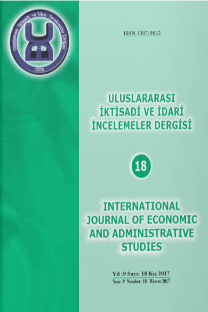A RESEARCH ON MANAGERIAL ETHICS PRACTICES IN TURKISH MEDIA ORGANIZATIONS
Yönetsel etik, iş yaşamının (çalışanlardan tüketicilere) yanı sıra bütün toplum kesimlerini ve çevreyi ilgilendirmektedir. Bu anlamda, yönetsel etik, toplumsal boyutta sosyo-ekonomik süreçte karşılaşılan sorunve çelişkileri çözmede ve/veya önlemede kamusal yarar açısından önemli bir işleve sahiptir.Bir uygulamalı etik alanı olan yönetsel etikin örgütsel süreçlerde metodolojik bir program dahilinde nasıluygulanacağı, uygulama sürecinde ortaya çıkan sorunları ve bu sorunların nasıl ve hangi yöntemler ileçözülebileceği çağdaş yönetim bilimi için önemli bir uygulama alanıdır. Demokratik toplumlarda bir türtoplumsal denetim mekanizması olan basın işletmelerinin kendi yönetsel süreçlerinde yönetsel etik kavram ve uygulamalarına sahip olmaları özel bir önem taşımaktadır.Bu çalışmada, Tam sayım yöntemi ile Türk medya kuruluşlarının yönetsel etik kavram ve uygulamalarından ne derecede yararlandıkları ve yönetsel etik eğitimine ne derecede önem verdikleri araştırılmıştır.
TÜRK BASIN İŞLETMELERİNDE YÖNETSEL ETİK UYGULAMALARI ÜZERİNE BİR ARAŞTIRMA
Recent advances in information technologies have allowed easier and faster access not only to technicalinformation and production, but also social, cultural and ethical information, viewpoints and assessmentsby the public at large without the scrutiny of a centralized administration. This ongoing process haspaved the way for a new people-oriented ethics to emerge, while, underlining the importance of suchconcepts as human rights, equality and freedom. Managerial ethics sphere of influence is not limited tothe business world. It is, in fact, concerned with the every aspect of social life. In this regard, it functionsat the core of socio-economic process in creating public benefit while solving and preventing problems.How managerial ethics, as an applied field, can be implemented within a methodology in organizationalprocess, and how to solve the problems that may arise along the way is an important field in modern ad- ministrative sciences. It is of special importance that, the media organizations, commonly referred to asthe fourth power in democratic societies, have an internal system of governance driven by managerialethics and its practices. This research is the investigation of the relationship between existence of mana- gerial ethics codes and existence of ethics training programs in Turkish media organizations throughquestionnaires.
___
- ALDAG, Ramon J, STEARNS, Timothy M. (1991), Management, Second Ed., Cincinatti, Ohio: Sounth Western Publishing.
- ARSLAN, Mahmut, BERKMAN, Ümit (2009), Dünyada ve Türkiyede İş Etiği ve Etik Yönetimi, TUSİAD / T-2009-06-492, İstanbul.
- BARTOL, Kathryn, David C. MARTIN (1994) Management, New York, McGraw Hill Inc.
- CARROLL, A B. (1991), The Pyramid of Corporate Social Responsibility: Toward the Moral Management of Organizational Stakeholders, Business Horizons
- COOPER, Terry L (2004), Big Questions in Administrative Ethics: A Need- for Focesed, Collaborative Effort, Public Administration Review, July / August, Vol. 64, No. 4
- ÇALIŞLAR, Aziz (1983), Ansiklopedik Kültür Sözlüğü, İstanbul, Altın Kitaplar Yayınevi
- DAĞDELEN, İlhan (2005), Managerial Ethics, Mevzuat Dergisi, Yıl: 8, Sayı: 90.
- DAFT Richard (1997), Management, The Dryden Press, Fourth Edition
- DEMİR, Hulusi, SONGÜR, Neşe (1999), Sosyal Sorumluluk ve İş Ahlakı, Balıkesir Üniversitesi, Sosyal Bilimler Enstitüsü Dergisi, Cilt: 2 Sayı: 3
- FLIPPO, Edwin, GARY B, MUNSINGER, M (1982), Management, Boston, Allyn and Bacon.
- GREENBERG J, BARON A. Robert (1997), Behavior in Organization Un- derstanding and Managing the Human Side of Work, New Jersey, Prentice. Hall, JUBB P.B. (1996), On the Definition of Whistleblowing and its Ap- plicability to the Accountants Audit Function, International Society of Business, Economics and Ethics, Tokyo, http // www.nd.edu/isbee/p-jubb.htm
- KHERA, Inder P. (2001), Business Ethics East vs.West: Myths and Realities, Journal of Business Ethics.
- KIREL, Çiğdem (2000), Örgütlerde Etik Davranışlar Yönetimi ve Bir Uygulama Çalışması, Anadolu Üniversitesi Yayınları, Eskişehir.
- KOHLBERG, Lawrence (1981), The Philosophy of Moral Development: Moral Stages and the Idea of Justice, (Essays on Moral development), Volume I, Harper & Row Publishersİ
- KREITNER, Robert (1995), Management, Boston, Houghton Mifflin
- KURTULUŞ, Kemal (1983), İşletmelerde Araştırma Yöntembilimi, İstanbul Üniversitesi Yayın No: 3128, İşletme Fakültesi yayın No: 145, İşletme İktisadı Enstitüsü Yayın No: 63, İstanbul.
- LAMBERTON, Lowell H, MINOR Leslie (1995), Human Relations: Strate- gies For Success, Chicago, Irwin Mirror Press.
- LEWIS, Pamela, GOODMAN H. Stephen, FANDT M. Patricia (1995), Management Challengers in the 21st Century, st. Paul, West Publishig
- MCNAMARA, Carter (2002), Complete Guide to Ethics Management: An Ethics Toolkits for Managers, (Çevrimiçi), http//www.mapnp.org/library/ethics/ ethxgde.htm,05.
- MESCON, Micheal H, MUCHEAL, Albert, KHEDOURI F (1988), Management, new York, Harper & Row
- MOSLEY, Donald C, P.H PIETRI, L.C MEGGINSON (1996), Management Leadership in Action, New York, Harper Collins.
- NAHAVANDI, Afsaneh, MAEKZADEH, A.R (1999), Organizational Behavior the Person Organization Fit, New Jersey, Prentice Hall.
- NALBANT, Eser, (2005), İşletmelerde Sosyal Sorumluluk ve İş Ahlakı, Yönetim ve Ekonomi Dergisi, Cilt: 12 Sayı:1, Celal Bayar Üniversitesi, İ.İ.B.F Manisa.
- ÖZGENER, Şevki (2009), İş Ahlakının temelleri: Yönetsel Bir Yaklaşım, Nobel Yayın Dağıtım, Ankara.
- ÖZGEN, Murat (2006), Gazetecinin Etik Kimliği, Genişletilmiş 3. Basım, Set Systems Tercümanlık Reklamcılık Yayıncılık Ltd.
- ÖZKOL Sedat (2007), 7-e Paradigması, Hayat Yayıncılık
- RACHMAN David J. (1996), Business Today, 8.bs McGraw Hill.
- ROBBINS, Stephen, COULTER, M (1999), Management 6. Bs, New Jersey, Prentice Hall.
- SAYİNER, Mehmet Anıl (2005), Managerial ethics Kavramının Örgütlerde Uygulanması, Yüksek Lisans Tezi, İstanbul Üniversitesi, Sosyal Bilimler Enstitüsü
- SAYLI, Halil, KIZILDAĞ, Duygu (2007), Managerial ethics ve Yönetsel Etiğin Oluşmasında İnsan Kaynakları Yönetiminin Rolünü Belirlemeye Yönelik Bir Analiz Afyon Kocatepe Üniversitesi Sosyal Bilimler Dergisi
- SCHERMERHORN, John R., (1989). Management for Productivity, Third- Edition, Carbondale: Southern Illionis John Willey & Sons Inc.
- SENCER, Muzaffer (1989), Toplum Bilimlerinde Yöntem, Beta Basım Yayım Dağıtım, İstanbul
- ŞENCAN, Hüner (2005), Sosyal ve Davranışsal Ölçümlerde Güvenirlik ve Geçerlilik, Seçkin Yayıncılık, Ankara
- TOOFFLER, Barbara (1986), Tough Choices, Managers Talk Ethics, NewY- ork, John Wiley&Sons Inc.
- UZUN, Ruhdan (2009), İletişim Etiği: Sorunlar ve Sorumluluklar, Dipnot Yayınları, Ankara
- ÜLGEN, Arzu (2003), Global Etik ve Global İşletmelerde Uygulanan Etik Yaklaşımlar Üzerine Bir Araştırma, Doktora Tezi, İstanbul Üniversitesi, Sosyal Bilimler Enstitüsü
- YUMLU, Konca (1994), Kitle İletişim Kuram ve Araştırmaları, Nam Basım Ltd, İzmir.
- ISSN: 1307-9832
- Yayın Aralığı: 4
- Başlangıç: 2008
- Yayıncı: Kenan ÇELİK
